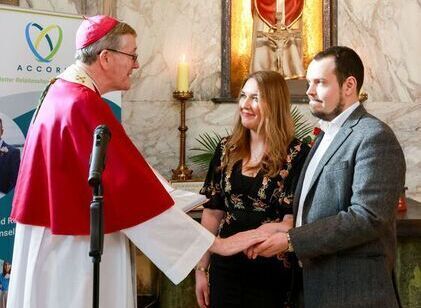[caption id="attachment_67166" align="aligncenter" width="600" caption="Reid bmp: Paddy is the man in the middle of this picture. Both he and his brother deserted to fight against fascism. After the war, they were both banned from employment. They, and their families, suffered years of destitution as a result."]
Ireland remained neutral throughout World War II, despite intense pressure from the USA and Great Britain. But Ireland had little real choice at the time. This was a country that had not long won its independence, and had then fought a painful and divisive civil war.
Joining the Allies would have alienated a significant part of the population, and probably led to widespread civil unrest. But it was an odd sort of neutrality, because over 70,000 men from the Irish Free State (as it then was) left their homes and families, took the train up to Belfast, and joined the British armed forces.
After the war, the Irish government made much of this fact to point out, quite rightly, that Ireland played a part in defeating Nazism and bringing the Holocaust to an end. But the story is not quite that straightforward.
When war broke out in Europe the Irish government prepared for a possible invasion. But the Irish army found itself seriously under-manned and woefully ill-equipped. Throughout the 1920s and 1930s, the army had been organized, re-organized, and constantly under funded. Now it lacked not just the essentials of modern warfare, such as airplanes, artillery, tanks and antiaircraft guns, but even sufficient stocks of small arms ammunition.
The wartime strength of the Irish army was intended to be 40,000 men. But after the initial surge of recruitment in 1939 and 1940, the army struggled to keep up to strength. And one of the reasons for this is that literally thousands of soldiers deserted, crossed the border into Northern Ireland, and joined the British armed forces.
These so called "deserters" fought in every battle and campaign of the Second World War. They served at sea on the hazardous Atlantic convoys, bringing food and raw materials from the USA to Britain and Ireland.
They flew near suicidal bombing missions with the RAF to destroy Nazi oil reserves and munitions factories. And they stormed the beaches of Normandy and fought to liberate occupied Europe from Nazi domination.
After the war, the Irish government subjected 4,983 of these men to what might best be described as a sort of legislative Kangaroo court-martial. They were condemned en masse, and in absentia, contrary to all the laws of natural justice, without representation or right of reply.
They were formally dismissed from the Irish army and stripped of all pay and pension rights. The government also prevented them from finding work, by banning them for seven years from any employment paid by state or public funds. And it circulated the deserters' names and addresses to every government department, town hall, railway station and anywhere else that they might look for a job.
Of course, the government had to take some action. But the legislation was framed so that it discriminated between those men who deserted from the Irish army and fought with the Allies, and those who deserted and remained at home in Ireland.
For instance, Michael Joyce and William Moore deserted from the Irish army in 1941. But unlike most of the other
deserters, they didn't join the British army. Instead, they started a new career as burglars. Not long after deserting, they were arrested on charges of breaking and entering.
But Joyce and Moore weren't banned from employment with the state, though the men who had fought against Germany were. Clearly, the intention was to punish only those men who fought with the British army after they had deserted.
It's difficult now, almost three-quarters of a century later, to realize the implications of the government's actions. Ireland is a society with a basic safety net of universal benefits, so no citizen, regardless of status, need starve or be homeless.
But in 1945 there were few job opportunities, apart from with the state and local authorities. And men returning from the war, with no entitlement to dole or benefits, and little chance of employment, faced a bleak future in Ireland. So Irish ex-soldiers were being pressured to live in Britain, where they would receive help in finding work and housing and were entitled to financial benefits. In effect, Irish citizens were being banished from Ireland by an Irish government.
The government of the day was condemned in the Dáil by the opposition party, Fine Gael. They argued, with some justification, that the government's legislation was illegal. It had been framed as an Emergency Powers Act after the end of the Emergency. Fine Gael deputy leader, Dr. Thomas F. O'Higgins, described the government's action as "brutal, unchristian and inhuman, stimulated by malice, seething with hatred, and oozing with venom."
But the government's actions were even more mean-spirited and vindictive than the opposition realized. Hundreds of these men had died long before they were publicly vilified and banned from employment. Men like Joseph Mullally would never cheat the dole queue and get a job with the council. He had already died on D-Day, June 6, 1944, fighting the Nazis on the beaches of Normandy - a year before his Kangaroo court martial.
As well as punishing the soldiers, the government also punished their children. In many cases the children were sentenced in courts of law, criminalized, and imprisoned. Now in fairness, even though the government's response to those deserters was vindictive and unconstitutional, we can at least understand that they had to do something.
But what is beyond all understanding is the state-sponsored abuse of soldiers' children. It is a grim irony that while Irish soldiers were amongst the men liberating Belsen concentration camp, the Irish government was running its own camps, set up to provide care for children whom the Irish state arrested and then handed over to the religious orders.
The regime in these camps - euphemistically called industrial schools - was characterized by physical and sexual abuse. Malnutrition and denial of medical treatment was the norm.
And in some of the more remote country locations children were even hired out to farmers to work in the fields as virtual slaves. Sometimes children's names were replaced with numbers. I have a document in front of me now, the neatly written column of names, starting with Sinead D ***, better known as 652 - her camp number. But three names on that list have the designation "SS." And "SS", in the twisted lingua of the industrial schools, indicates the child of a soldier, one to be given "special treatment."
Mary G*** was one of those children who received the benefits of special treatment. She was incarcerated in Goldenbridge (Dublin) at the age of two, as her admission papers state, "with her charge and sentence of detention," until the age of 14. Mary was kept in Goldenbridge (a convict refuge originally built in 1855) for over a decade and only allowed out for one day every year. Her father, a soldier, wrote increasingly desperate letters to his young child throughout the Second World War, letters the Sisters of Mercy withheld from her for over half a century.
It's hard to imagine the feelings of a little girl, frightened, alone, living a life of constant fear of the beatings that were a routine part of her day. She told me she wondered why her daddy never wrote to her. And what anguish must her father have felt. How does a soldier feel facing combat and possible death, waiting for a letter from his little girl - a letter that never comes.
When this was brought into the public domain in my book, "Spitting On A Soldier's Grave," Irish people responded with a mixture of surprise and anger. "That's dreadful, I never heard of that before" was a typical comment. And there were many calls for restorative justice for the so-called deserters.
But it takes more than words, mine or anyone else's, to change things. It takes action. So Peter Mulvany, an ex-soldier like myself, started a campaign to have the WW2 veterans pardoned. I'm helping Peter with the campaign, and we are being supported by politicians like Senator David Norris, Gerald Nash T.D. (Labour), and representatives from Sinn Féin and Fine Gael.
But time is not on our side. There are very few of the veterans still left alive. So we are calling on the government to take action by 11 November 2011. This coincides with the end of the current Irish presidency, and is also Veterans Day - an appropriate time for an Irish government to show some compassion and humanity to a few of its elderly citizens.
If you would like to find out more about the Irish veterans, the book, "Spitting on a Soldier's Grave," is available via all good book shops, or on-line from Amazon.com. And if you wish to help the Irish Soldiers Pardons Campaign (WW2) please email An Taoiseach Enda Kenny T.D., to indicate your support at taoiseach@taoiseach.gov.ie For more information on the campaign go to www.forthesakeofexample.com and www.robertwidders.co.uk.









